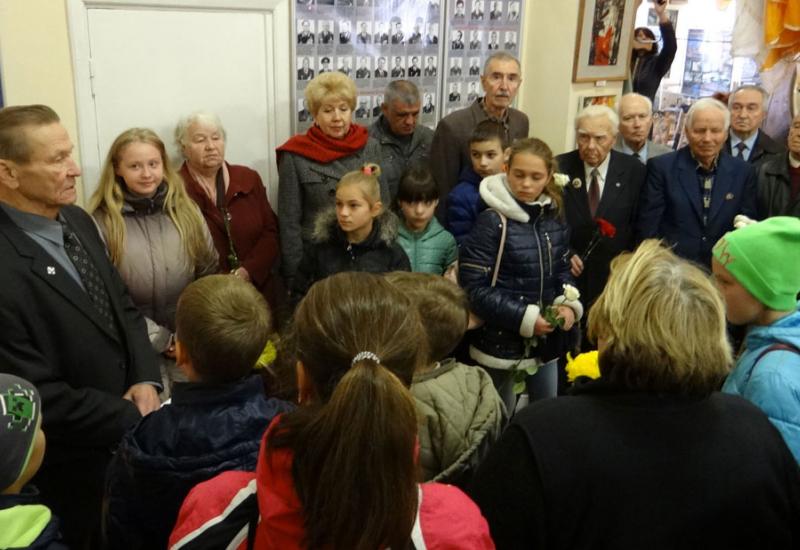October 24, 2017 the State Polytechnic Museum in the National Technical University of Ukraine “Igor Sikorsky Kiev Polytechnic Institute” hosted a roundtable on two tragic dates - the 57th anniversary of the rocket catastrophe in October 24, 1960, which killed 74 people and another 52 died in hospitals, and the 54th anniversary of the rocket catastrophe in October 24, 1963, in which eight people died (both occurred at the Baikonur Cosmodrome).
The meeting was attended by Director of the State Polytechnic Museum Natalia Pisarevskaya, Lieutenant General Anatoly Matveev, the head of the Interregional Organization of Veterans of the Rivniches Volunteers of Ukraine Major-General Mykola Filatov, relatives of the killed rocket men: sister of the deceased Lieutenant Valery Sinyavsky - Lydia Bohatyryova, granddaughter of the deceased Lieutenant Colonel Andrei Sakunov - Alina Ternitskaya, wife brother of the deceased Senior Lieutenant Eduard Glushenko - Lidia Glushenko, member of the combat calculation for launching the P-16 missile, Lieutenant Colonel Anatoly Filoghin, head of the military reception from the “Arsenal” mine Nikolai Ponomariov (the KB of which was preparing a sighting system for this missile), veterans of the cosmodrome Baikonur, Plesetsk, Kapustin Yar, RVSP, members of the club “Do Zirok” of the Center of creativity “Shevchenkivets”, students of the 6th form of the Secondary School № 169 with the head Valentina Ivashchenko . Unfortunately, because of the state of health, take the wife of the deceased captain Volodymyr Agha - a graduate and a long-time employee of the KPI Olena Agay was not able to participate in the round table.
The meeting was opened by the Head of the Department of History of Aviation and Astronautics at the State Polytechnic Museum Alexander Boltenko. He briefly described the circumstances of the disaster.
The first occurred during the preparation for the first launch of the P-16 rocket development of the CB “Pivdenne”. In conditions where the rocket structure was not properly worked out, and the Soviet leadership demanded the launch as soon as possible, an unauthorized launch of the second stage engines took place on October 24, 30 minutes before the planned launch. The flames tore out the tanks of the first degree, and dozens of people died in a fire of torture, and hundreds got burnt.
The participants of the round table honored the memory of the dead with a minute of silence. the Requiem for the dead rocket launchers was sounded, performed by his author - the veteran of the Plesetsk Spaceport Lieutenant Colonel Mykola Dvorsky. The participants put flowers on a memorial stand dedicated to the dead fighters.
Major General Nikolai Filatov stressed that the task of veteran fighters is to pass on the best traditions to young people, to bring them a sense of responsibility and pride in their profession. A member of the combat settlement of the launch of the P-16 missile, Colonel Anatoly Filoghine, who was personally familiar with many dead rocket launchers, spoke about the tense situation that prevailed on the launch site before the catastrophe.
On October 24 at Baikonur, rocket and space technology is not being conducted. On this day, residents of the city come with flowers in the Soldier's Park to the graves to honor the dead rocket men.
Lydia Glushenko told how she went to Baikonur to honor the memory of the dead. “I myself am a teacher and I know: one thing when students go to some kind of event forcedly, and quite different - when they go to the Soldiers' Park on the call of the heart.”
Viacheslav Akimov reminded of a catastrophic event that occurred on 18 November 1980 at the Plesetsk Cosmodrome, during which 44 people died.
Mykola Ponomariov said that the KB of the Kiev plant “Arsenal” was preparing a sighting system for this missile. Then, in 1960, two engineers of their KB - Petro Weyberman and Yevgeniy Pavlenko died at Baikonur.
The State Polytechnic Museum workers are trying to do everything to keep memory of the heroic and tragic history never faded away.

